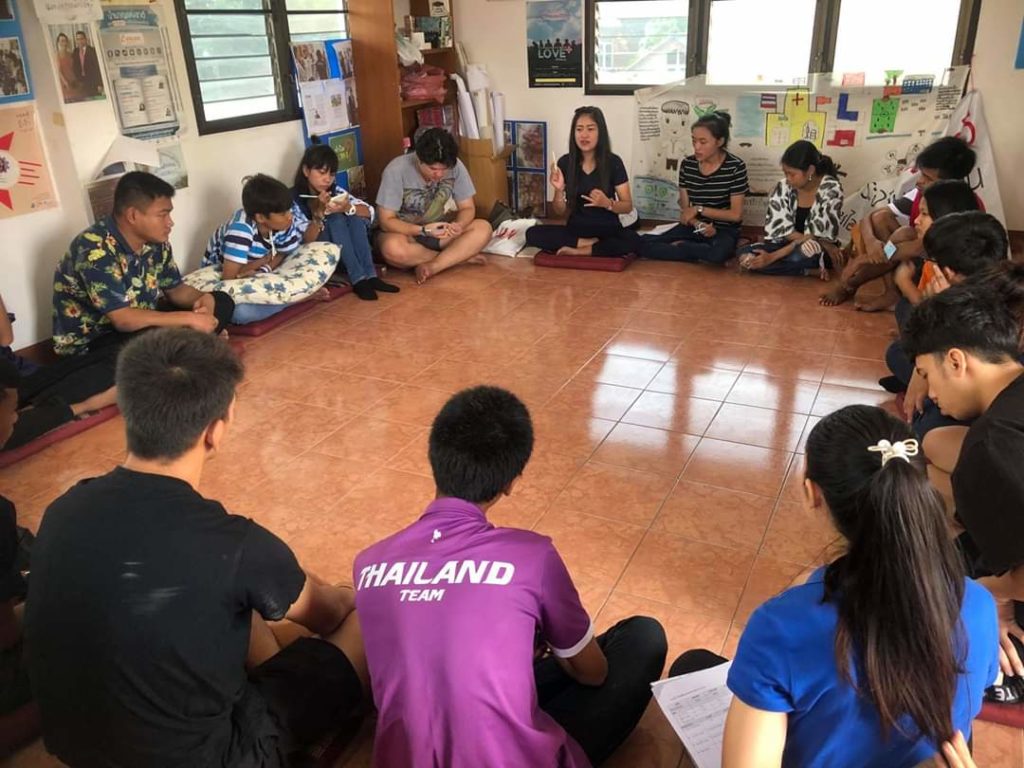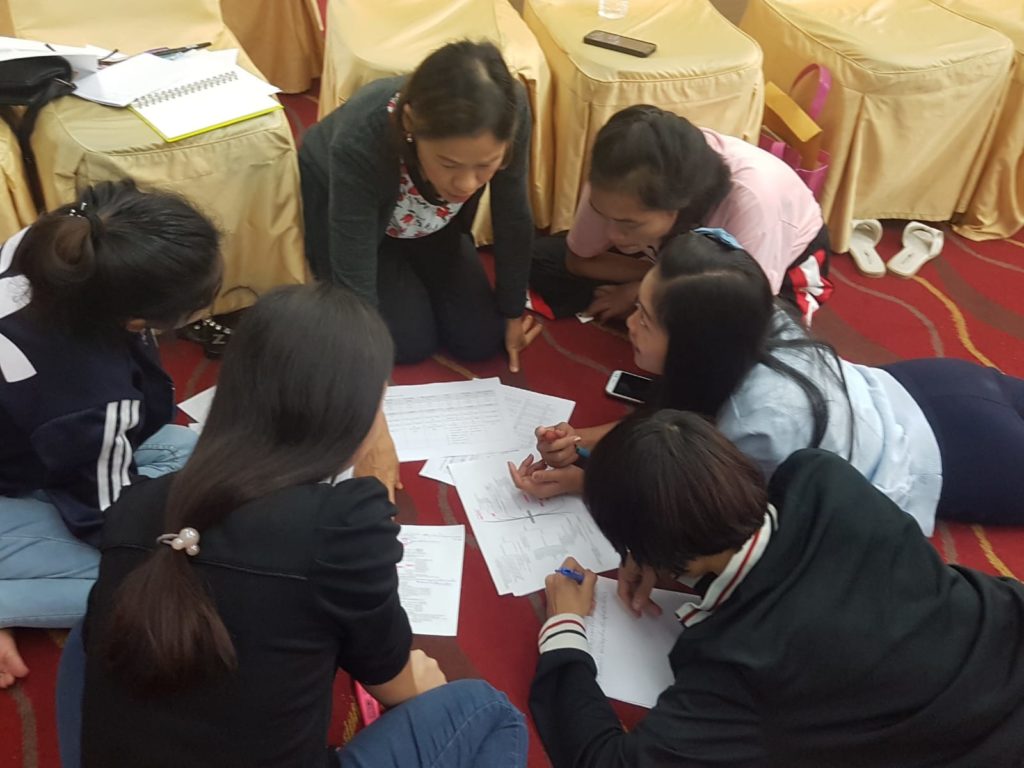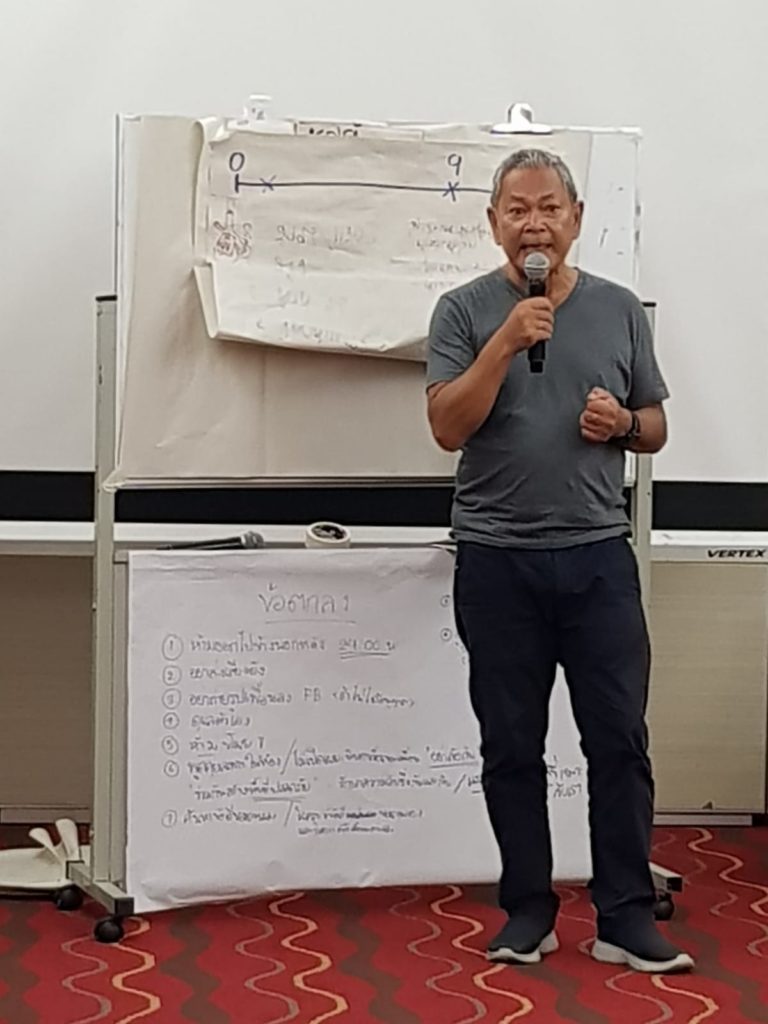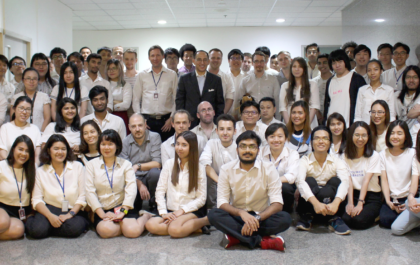May we just put it out there that Tew Bunnag is a renaissance man?
T’ai chi and Chi Kung master, Meditation teacher, Author, Humanitarian, Linguist, Economist, Family man, and not necessarily in that order. He also works in the field of Death and Dying, shining a light of compassion on a subject that most of us prefer to avoid.
This interview shows another side of Pi Tew, that of a Social Entrepreneur, and is especially interesting for giving us a fresh perspective on children who have grown up in the shadow of HIV and Aids. As teens and young adults, they are too old to be in an orphanage and too young to negotiate the often cold and prejudiced world.
And so Little Birds was created.
A place for refuge and safety.
A home for peace and joy.
Genup: Tell us about yourself.
Tew: I’m a 70-year-old man, born in Bangkok. I’m Thai but spent most of my life in Europe notably in England where I went when I was 7 and I stayed there. I was educated there, and I went to university there and then I decided to make my life there, partly because of the work I’ve done. But I never lost touch with Thailand. I always used to come back and never lost the feeling of being Thai either. And, I feel I have a place in both worlds. I live in Spain; I have a family there and in Italy. My son is half the time here and half the time there. It’s just how it is with my life. But I am Thai too, and when I get back to Bangkok, it takes me two minutes to get back into the rhythm of this crazy city. Like I never left.
Genup: What was your initial spark?
Tew: I started as a volunteer for Mercy Center around the year 2000, and I’m one of the directors on the board of Human Development Foundation, which is the foundation behind Mercy Center in Klongtoey, Bangkok. There I volunteered to look after children and adults with AIDS in the hospice that we used to have. The hospice is now closed, but the work still goes on and we now emphasize home care which is a much more useful way to do things. But in those, there wasn’t home care, which means a team visits regularly taking basic provisions and so we also involve the family. We still do take in children that have no home and nowhere to go, this is apart from the street children, but the important thing is that when I went to work there, the way that HIV positive people were treated was very bad. There was a stigma, there still is, but in those days the very poor had nowhere to go and there were not well received in the hospitals. So they basically came to us to die. But when I joined, one of my intentions, along with one wonderful director of the AIDS director, a nurse trained in England, we decided that we wanted to turn the whole thing around. So instead of just helping people to die like in a hospice, we wanted to help people survive it. That’s why and how the idea for Little Birds came along, little by little. But the real spark came from the kids themselves actually. We were the victims of our own success because when I first joined, kids and adults were dying like flies. But with the change, I won’t go into this in detail, but we started to get to the kids earlier, to the adults earlier, we started to promote educational programs in the communities. So people got access to medicine early. And sometimes it wasn’t a case of access to medicines but proper nutrition as far as the kids were concerned. So little by little, what started to happen was that fewer kids were dying, and they were growing up with us, surviving with us. And then there was this new problem, like what do you do when they survived and grow up to, say 18? They would leave our center. And then there were a new bunch of problems. Remember that this is a modern disease. Nobody has any experience of how to go on treating people. Let’s say you have diabetes or something, we know what to do. But with AIDS and HIV positive, there is a whole new generation that have survived from infancy and are now young adults. And what problems these young adults must face is tremendous. So the kids who survived with us at Mercy Center, when they left and rejoined Bangkok they came back to us and said, “we can’t take it, we need help,” And one of them coined the term “Little Birds”, as in “we’re like little birds who can’t fly and need to come back to the nest. And then not just myself but this director I mentioned earlier and members of our team from Mercy knew we had to do something. Because they’re like members of our family and we couldn’t just abandon your children when they’re 18\. You have to see them through. And in this case, these children of ours have had amazing journeys to survive, through unimaginable, incredible things that have happened to them. They’d faced their own death; they’d faced their parents dying with us and so on. So they’re so mature in one way, they’ve faced so much that adults don’t, on the other hand, they cannot really function effectively in society. They’re very special. They’ve seen death in the face, they’ve seen more than most adults have seen, they’ve been ill since the day they were born. Many of them have not known much of wellbeing, you know, a long stretch of being really well. So they’re very special. I’m not being romantic here. They’re very special because of this experience. Now, the whole point is, does our society see that and respect that?
No.
They carry on being stigmatized and discarded and treated almost like dirt. So there are many problems that arise, not just for the young adults with HIV in Thailand, but there are many all over the world, the same stigma in Africa, India and so on. And so the issues are much bigger than local. The issue is about a whole generation who, through no fault of theirs, remember these are kids who got infected through their parents. They didn’t ask for this. So to be judged for it and stigmatized for this is just a gross lack of decency, a lack of compassion, lack of intelligence on part of society. Whereas they could be the educators. These kids are special because of their closeness to mortality. They have been through horrific things, have been abandoned. They are very special. Anyway, Little Birds grew out of this, out of adults like us saying we must support them. And I can’t remember the year this was, I think it was about 8 years ago and we still haven’t managed to establish a foundation because of the obstacles placed in our way.

Genup: What was the biggest hurdles you faced and how did you overcome them?
Tew: The biggest hurdle still after all this time, even after all the funds that we have, we still cannot legally establish ourselves as a foundation. It’s about to change. I don’t want to go into details of politics but you know NGOs, in general, are not popular with governments and especially NGOs that would give according to some people the wrong impression of Thailand. They don’t want to publicize all this.
The other obstacle was that once the kids left Mercy, where we were like a family and they were well looked after, very secure and everything, once they started dispersing the question was how to keep them together. In these recent years, there are social media and that is incredible in building a network. But in those days it was impossible. But we knew that we had to have a physical center for emergencies because we found out very early on that the kids who left us couldn’t find housing or jobs, and they were sleeping out rough and things like that. So then we had to find a rental place which served as an emergency house and also as a meeting place. What we didn’t want was for them to depend on us and become an extension of Mercy. And by the way, Little Birds is independent of Mercy Center. That was the kid’s choice too. They wanted help but they also wanted independence. So, we’ve tried to do that, and it has come along very well. And right now, as I speak, three of the young adults, one of them from group and two from the Red Cross are giving conferences at the International AIDS conference in Amsterdam. And because the work of Little Birds is now recognized and this has taken a lot of doing, a lot of maybe mistakes isn’t the right word, since it is all new territory. We are pioneers in this and it’s because of some of the characters of the children – I call them children but they are now 22, 25 years – we have 57 members, not all of them came through Mercy and we have thousands more from all over Thailand now. And there are different groups all over Thailand and our Little Birds now act as trainers to go and help them to establish these groups and networks and encouragement. And they encourage them to take medicines which are very important.
Genup: How is Little Birds funded?
Tew: At the moment, purely from donations, which I find from here, from Europe and from England. And great people, mainly foreigners here who really like the work and they donate, they make sure that we can afford to rent a good place in a hotel during a workshop and conference. I’ve just got hold of and the emergency fund from Europe for example, things like that. I think that the work is so important and it hits people so directly that getting donations isn’t the problem. The problem is that we don’t want Little Birds to be dependent on donations. We would like a different model where Little Birds generates its own income. It’s not just a financial thing, it’s also about pride, about acceptance. In Cambodia, in Phnom Phen for example, there is this setup for years now, where HIV positive people run a restaurant. So the customers who go there not only pay for the food they also learn that they are not going to get infected. They’re not going to die because the cook is HIV positive. It sounds so obvious and stupid and yet it’s not. The big problem for these young adults with HIV positive is whether to reveal or not. Most of them don’t. Like when they get a job they don’t announce that they are HIV positive, and we have actually campaigned for that not to be a condition of employment. But it’s still a burden for the young adults, because they know that if they say that they are HIV positive, the others may not even eat with them. The owner of the factory or whatever may even kick. them out. Well, they’re not all bad factory owners or anything, but the one that we have got to and are educated understand that it is not easy to get infected and won’t be transmitted by a mosquito or something. But folk logically, it’s still making people very fearful. So these young adults don’t want to reveal. And take it to relationships, if they have a boyfriend, girlfriend, what do they do? Do they or don’t they? This is their immense burden. And it’s so strong that it produces depression. Depression from this stigma is a worldwide phenomenon with dire consequences. In the last year, we lost three members. One from suicide and the others also like suicide because they stopped taking their meds. They are totally disenfranchised. I mean society wouldn’t do this if they had diabetes or something. But because they have this virus, they feel stigmatized. Which is not only absurd and thoroughly sad but is stupid. Because the government like most governments tend to take this line that AIDS is fixed, we’ve got it under control. But I’m sorry, it’s not! So because of this complacency, people are having unprotected sex, the sex industry is still going pretty strong, the drug that fuels this whole behavior, the anti-social behavior and so on is still in full swing. It’s all there. We in the field are getting ready for another round. And in this other round that is bound to happen, who is it that can really help? Its young adults like this could be the educators. This is our vision. And they’re beginning to, like this AIDS conference in Amsterdam, this is the first time that this generation who were born with it can now speak for themselves and tell people their experiences and how they survived and by what they survived and what the problems really are. Not explained by us but they themselves can talk. This is enormous. And in doing that they talk about sexuality and relationships, and to me it is a tremendous chance. And so Little Birds is so important to me.

Genup: How do people find out about Little Birds? What marketing do you use?
Tew: We actually don’t have a website yet. We mostly use the Facebook group and everything mostly is word of mouth. We are lucky to have excellent volunteers, notably Khun Usanee. But yes, we will have to get online soon.
The young ones have their own network and now after Amsterdam, the network is sure to go international. We don’t have an online account for now for people to donate money. The problem is that the people who want to give money will be giving to a personal account since we are not yet a foundation. But by the end of the year, hopefully (note: This interview was in 2018), it will solve this problem. As of now, I hesitate to ask the people from Spain and England, although I trust the personal account completely, but it doesn’t look good.
Genup: You are 71 years young, and you have done and continue to do so many different things in life. What is your most memorable failure? And how did you bounce back?
Tew: My most memorable failure was when I was much younger and very idealistic. I was working in a community that was very famous at the time called Chapter House in England. And, people were coming to learn T’ai chi and meditation and yoga and they were coming to get better, and get well or to prepare for dying. We were serving this wide range of people and we managed to spread the dharma and T’ai chi in the early 1970’s when this stuff wasn’t really on the map. And it was a very exciting place to be because we combined Eastern practices and traditions with Western approaches of therapy such as Gestalt and Dreamwork. Very exciting times. I was totally committed to this, I was an assistant director at that young age. The failure was the failure of doing this in a community. Let me explain. What we avoided very successfully was the cult thing. Remember this was parallel at that time to Bhagwan Rajneesh and Osho and we did not want to go that way. On the other hand, the failure for me was that I thought we all had the same vision and we could all get on in the community. The failure for me was the failure of our human nature. You put people in a community, or in a group and there is always politics, there’s always competition, there’s always a power play. I was the Assistant Director, and since the Director was always away in America, I found myself having to sort out these politics, ego issues. I still do in the NGO but that time I was full of idealism and I thought that this was the way to live, in a commune, which means a big, extended family. And it was a learning thing and it all unraveled. I still kind of believe in the community but it couldn’t be like that. Even though we managed to avoid the cultish thing and so on, but it has to be much more work if we were to do something similar to that today. I reckon that was a big failure on my part, that I couldn’t hold it together. I didn’t have the means then to resolve the ego and political issues that came up. I didn’t have the depth, the experience. And since then I have tried to avoid communities altogether.
And what else, golly, if I was to really talk. Personally, I made a lot of mistakes by mixing personal life with public life. I made a lot of mistakes because when I was with my family, I was totally committed but the more successful my work became, the less I was with my family. And I never got the balance right. And my first two children paid a big price for that. And I look back with regret. And that was a big failure on my part.

Genup: What don’t you like about all the various jobs, enterprises that you do?
Tew: That really, not being able to find the balance between family and career. And I don’t know who does, really. I don’t know who quite gets it right. But in my particular line of business and job, it’s not just going out to work. But you get involved in all these families, you’re sucked into peoples’ lives. And now that I work with Death and Dying, it’s even more, with their emotions and stuff. And then when one my children may say, yeah you can be out there but you can’t be with us, they’re right. I have to admit. Not that I’m not very involved with my kids, but it gets hard.
Genup: How do you stay motivated? What drives you?
Tew: The Source. I give thanks every day that there’s a meaning to my life and to have discovered the way to make somebody’s life better, even to make somebody’s dying a little better. You know, I have down days as well, just like everyone, but not very many, because, and I don’t want this to sound grand or anything, but it is the sense of life. You know, people are always saying why am I here, this life is absurd and ridiculous, I’m going to die anyway, what’s the point, etc. I went through all that too, when I was young, in a big, big way. But the sense of life is a sense that you have something to do that gives you deep satisfaction. And it can’t come with just making money and being secure. You can be secure, I hope everybody has enough and is secure, but beyond that, you have to find the motive. The mission. Not a mission to save the world or anything, but the mission to add one drop of goodness. And to do your best. Just to see one child come in destroyed and then to see them smile and play, that is worth more than anything.
Genup: Who do you admire? Any people, books that inspire you?
Tew: Yes, but they are anonymous. The poor. That’s why when I come to Bangkok, I always go to the slums, because despite living next to an open sewer, with rats everywhere and no money to spend, with just the sense of survival, they manage to maintain their goodness and their niceness, and compassion and integrity. These are the people I truly admire. Because when I’m there in those awful places, I think in this place it is so easy to lose your humanity and turn into a drug dealer or something because you’d want to get out and the only way to get out would be through crime. So yes the people there are amazing.

Genup: What would you tell your younger self about the path he was about to take?
Tew: I would say, all the confusion of your young self, all the pain that you feel, have lived, and all the sense of depression, absurdity and so on, they are all very useful. They all become a part of your empathy and compassion and that in the school of the streets of life is what you are, what you discover and to keep going. It’s ok to question, to be depressed, to not know, to make mistakes. The pain that we know when we’re young, becomes the source of our compassion. But of course, we have to work at it. Spiritual practices come in, and things like martial arts come in. You can’t get that from philosophy, it doesn’t work that way. You’ve got to have spiritual practices. And that’s where I am grateful, you know, along with my madness, my craziness, somehow I got initiated very young, and thanks to my nurse, I got into spiritual practices.
Genup: What does success in life mean to you?
Tew: Success in life, going back to what I said earlier, is to make a contribution to others. Success in life is to live in peace, to be at peace with oneself and to emanate, to transmit that peace to others. That is incredibly difficult. It’s not like you to achieve peace, you’re there. It’s a daily battle. And it’s not like on a material level where you can say, you’ve earned something and you’re successful. But on a deep human level, which I call the spiritual level, every day is success and failure. You’re aware of your own nastiness or petty mindedness. And every day you can say, not from the ego point of view, you know inside of you, there is this sense of pleasure. Remember pleasure is very important. I’m not talking about carnal pleasure or anything. I’m talking about the deep pleasure or delight. Delight in friendship, delight in very simple things like clouds and flowers, delight in meeting people, delight in being a part of them. That is a success.
Genup: Thank you so much, Pi Tew.
Tew: My pleasure.
For questions and donations, please contact Khun Usanee at +66 84 263 6591
Also, stay tuned for their website and Facebook page.
Related posts
Today's pick
Hot topics
Welcome to Generation Upstart
It starts with an idea — a fusion of thoughts and experiences, a blending of desires and dreams. Bursts of electricity fueled with faith, love and creativity leap across synapses generating the necessary expression to give it real form and substance. Sometimes, an entrepreneur’s call…
Careerlist: Never Waste a Crisis
According to Michael Scissons, the most important thing you can do to maximize your chance of entrepreneurial success is to build your tribe. Start as early as possible, trimming and pruning like a patient gardener, while continuing to add value to the network. For these…
RingZero: On Employee Satisfaction and Success
Great people make the great teams that make the great workplaces, and Mr. Asmat Yousri is a big believer in people. After all, he has been at this since 1996. An ex-banker, he saw no obstacles transitioning from a corporate position to an entrepreneur. In…



